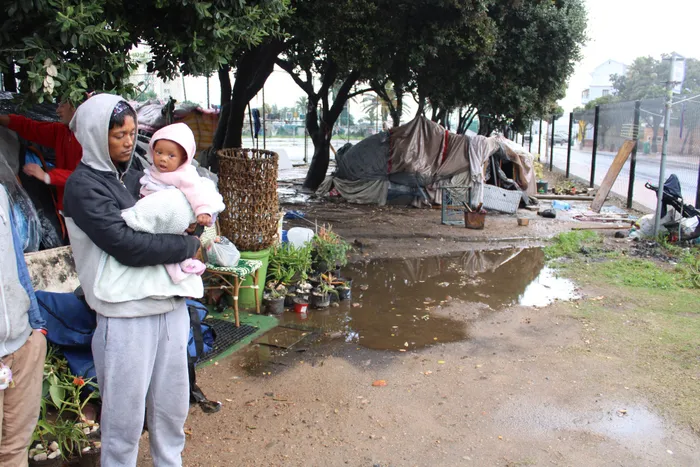Homeless reluctant to go to shelters despite the weather

Lizaan Anthas and her five-month-old baby Nihan live at “Tent City” opposite Sea Point police station.
Despite the winter rains coming down hard on their makeshift shelters, homeless people living on the Atlantic Seaboard are reluctant to make use of the shelters in and around the city.
With more rain forecast for the coming weeks, the street-based people told Atlantic Sun they were prepared and that they had raincoats and plastic coverings that they use to shield themselves from the persistent rains.
“I’ve got my plastic that I cover myself with, I have on my rain coat and I’m doing just fine. I don’t want to go to a shelter because I’m on a religious mission,” said Rector Ndlovu, 62, who has been on the streets since 2018.

At “Tent City”, opposite Sea Point police station, a fire damaged tents a few weeks ago and despite the leaks, the residents there say they are happy to remain at this location.
“Our tents are leaking because we had a fire here a few weeks ago, some tents burned down, some are damaged and leaking, and here we are in the cold and wet,” said Shaun Hibbert, 50.
“I won’t go to a shelter because they don’t allow us with babies, they will take my baby away from me,” said Lizaan Anthas, 33, who has a five-month-old.
Hassan Khan, CEO of Haven Night Shelter said there were specialist organisations that would assist people from the streets who have children.
“At the Haven we can provide assistance, we can do an assessment and find the most appropriate place for her, for mothers with children,” said Mr Khan.
“She is probably not aware of this service but there are City of Cape Town field workers on the street that are a possible gateway to one of those organisations that can meet her needs,” he added.

“We haven’t received any assistance from the City or anyone else, it’s been tough in this weather,” Ms Anthas added.
“It’s really heavy days for us,” said Angelo Jansen, 42, who has been living on the street for 12 years. “I sleep under a plastic covering. I don’t want to be at a shelter, I feel I am better off here, I won’t go to a shelter.”

The City of Cape Town announced that they were adding more than 550 shelter beds and four new dormitories at the Safe Spaces in the city in preparation for this winter. Among these is the Culemborg Safe Space on the Foreshore where capacity has been increased.
The Safe Space model includes dignified shelter, comfort and ablutions, two meals a day, access to a social worker on-site, personal development planning, identity document and social grant assistance, access to substance and alcohol abuse treatment, skills training, help finding a job, and access to EPWP work placement.
“Plans are gaining momentum to expand the City’s Care Programme to help more people off the streets,” said Mayor Geordin Hill-Lewis.
“Our first step was to direct an extra R10 million to more shelter beds this winter, more than tripling the grant-funding for NGOs. We’ve now also upped the Care Programme budget to R77 million for 2022/23. Over the next three years, R142 million will go to expanding and operating City-run Safe Spaces beyond the CBD and Bellville.”
‘We are calling on Capetonians to help us Give Dignity by donating to recognised shelters and NGOs this winter. We can do more together to help people off the streets,” he said.

The homeless people who spoke to Atlantic Sun, however, are adamant that they won’t make their way to the Safe Spaces.
“We know that winter is coming so we need to prepare for it, we know this. So most of us are ready, but we can’t make fires because it attracts uninvited guests so that’s my only complaint,” said Cheryl Williams, 47.
Muneeb Harnekar, a facility manager at the Safe Spaces said they had social workers who would draft a personal development plan with the homeless people in order to assist them.
“Our ultimate goal when taking someone from the street is to be able to either unify them with their family, return them to their community of origin or enable them to live independently,” he said.
